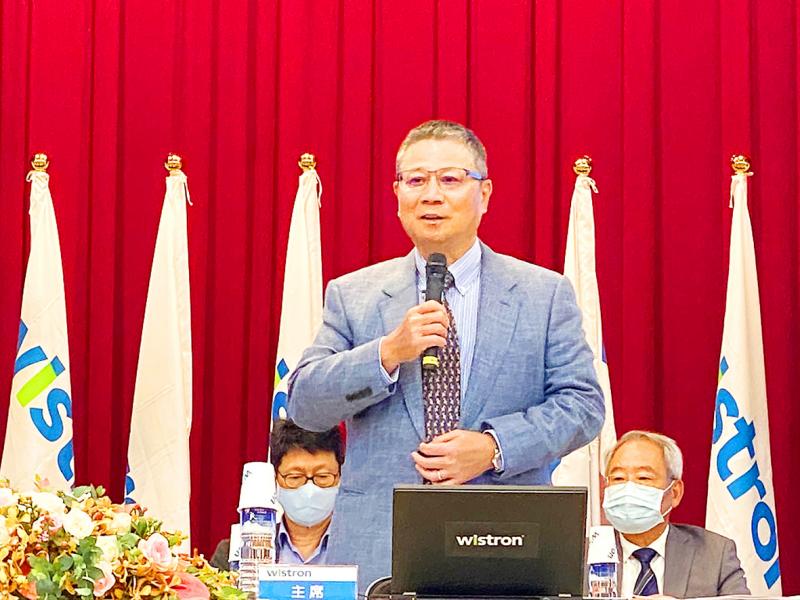Wistron Corp (緯創) on Friday said that its board of directors had agreed to sell two of the firm’s wholly owned subsidiaries to China’s Luxshare Group (立訊集團) as part of its plans to better integrate group resources and improve its smartphone assembly profitability.
The contract electronics manufacturer said that it would sell Wistron InfoComm Manufacturing (Kunshan) Co Ltd (緯新資通崑山) and Wistron Investment (Jiangsu) Co Ltd (緯創投資江蘇) as well as related businesses to Luxshare for 3.3 billion yuan (US$471.95 million).
The final transaction value would be adjusted based on the actual book value on the business transfer day, Wistron said in a statement.

Photo: CNA
It would proceed with obtaining relevant approvals, Wistron said, adding that it is likely to close the deal by the end of the year.
The company’s plan to sell the Kunshan plant, which focuses on smartphone assembly, came as its notebook computer and server business showed strong growth this year, thanks to demand driven by remote working amid the COVID-19 pandemic.
Analysts said the firm would continue to reduce losses at its smartphone assembly business in China and improve operations at its handset plant in India for better profitability.
“We are positive on this deal, as Wistron has been focused on product mix improvement to increase gross margin for years,” Yuanta Securities Investment Consulting Co (元大投顧) analyst Harvey Kao (高啟瑋) said in a note on Friday.
“Although Wistron’s gross margin has been beating consensus, its smartphone assembly business — accounting for less than 20 percent of total sales — has continued to struggle. We believe [the] sale of its smartphone assembly business in China to Luxshare will further enhance Wistron’s profitability,” Kao said.
China-based Luxshare Precision Industry Co (立訊精密) is a supplier of acoustics components, motors, connectors and cables for iPhones, and the company has been rumored to be eagerly expanding into the iPhone assembly business, as Apple Inc reportedly wants to partner with a third iPhone assembler beyond Taiwan’s Hon Hai Precision Industry Co (鴻海精密) and Pegatron Corp (和碩).
Citing industry sources, Taipei-based DigiTimes on July 10 reported that Luxshare wanted to acquire a plant from Wistron that is used to manufacture iPhones in China.
Wistron reported second-quarter revenue of NT$221.21 billion (US$7.48 billion) , up 27.3 percent quarterly and 7.6 percent annually, due to better than expected laptop shipments and server demand from enterprise and cloud clients.
Yuanta forecast that Wistron’s revenue for this quarter would increase by 4 percent quarterly and 5.8 percent annually to NT$229 billion, supported by the smooth recovery of its server assembly business in Mexico.
To meet rapidly changing customer needs, Wistron said that it plans to make more investments in Taiwan, as well as strengthen its manufacturing capacity in China, the Czech Republic, India, Malaysia, Mexico and Vietnam.
“Moving forward, Wistron will continue to focus on optimizing its business portfolio and global footprint to cope with an ever-changing environment,” the company said.
“After the transaction, the company will be more aggressive to invest in and develop future technologies while targeting new business areas such as 5G, artificial intelligence, automotive and healthcare to further enhance its product portfolio and profitability,” it said.
Wistron shares fell 0.56 percent on Friday to close at NT$35.8. They have risen 26.28 percent so far this year.

A proposed 100 percent tariff on chip imports announced by US President Donald Trump could shift more of Taiwan’s semiconductor production overseas, a Taiwan Institute of Economic Research (TIER) researcher said yesterday. Trump’s tariff policy will accelerate the global semiconductor industry’s pace to establish roots in the US, leading to higher supply chain costs and ultimately raising prices of consumer electronics and creating uncertainty for future market demand, Arisa Liu (劉佩真) at the institute’s Taiwan Industry Economics Database said in a telephone interview. Trump’s move signals his intention to "restore the glory of the US semiconductor industry," Liu noted, saying that

On Ireland’s blustery western seaboard, researchers are gleefully flying giant kites — not for fun, but in the hope of generating renewable electricity and sparking a “revolution” in wind energy. “We use a kite to capture the wind and a generator at the bottom of it that captures the power,” said Padraic Doherty of Kitepower, the Dutch firm behind the venture. At its test site in operation since September 2023 near the small town of Bangor Erris, the team transports the vast 60-square-meter kite from a hangar across the lunar-like bogland to a generator. The kite is then attached by a

Foxconn Technology Co (鴻準精密), a metal casing supplier owned by Hon Hai Precision Industry Co (鴻海精密), yesterday announced plans to invest US$1 billion in the US over the next decade as part of its business transformation strategy. The Apple Inc supplier said in a statement that its board approved the investment on Thursday, as part of a transformation strategy focused on precision mold development, smart manufacturing, robotics and advanced automation. The strategy would have a strong emphasis on artificial intelligence (AI), the company added. The company said it aims to build a flexible, intelligent production ecosystem to boost competitiveness and sustainability. Foxconn

Leading Taiwanese bicycle brands Giant Manufacturing Co (巨大機械) and Merida Industry Co (美利達工業) on Sunday said that they have adopted measures to mitigate the impact of the tariff policies of US President Donald Trump’s administration. The US announced at the beginning of this month that it would impose a 20 percent tariff on imported goods made in Taiwan, effective on Thursday last week. The tariff would be added to other pre-existing most-favored-nation duties and industry-specific trade remedy levy, which would bring the overall tariff on Taiwan-made bicycles to between 25.5 percent and 31 percent. However, Giant did not seem too perturbed by the